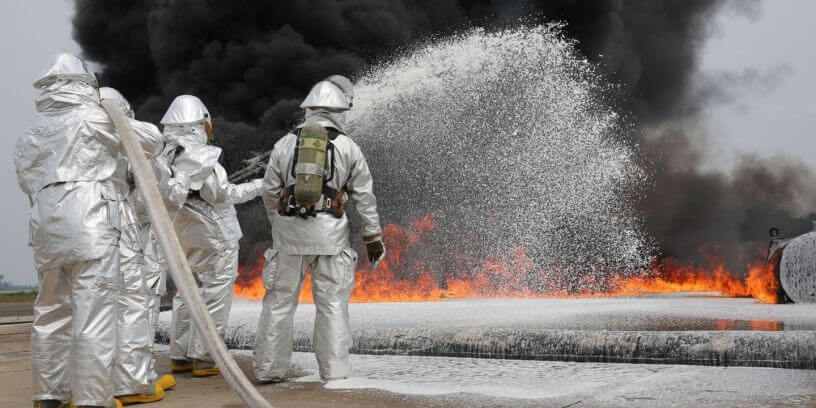French Island Wells Show PFAS Pollution
State investigates, gives bottled water to residents of island off-shore from La Crosse.

Marines fighting fires with foam, a product that uses PFAS . Photo by Lance Cpl. Shawn Valosin/U.S. Marine Corps.
The Wisconsin Department of Natural Resources (DNR) and several other state agencies are working to provide bottled water to residents of French Island with private drinking wells that may be contaminated with harmful “forever chemicals.”
The island has 1,200 private wells and PFAS chemicals have been found in 180 of them, while other residents await test results.
The DNR is working with water treatment company Culligan to provide residents with five-gallon jugs of clean water.
French Island sits across the Black River from the City of La Crosse. The La Crosse Regional Airport is on the northern part of the island while the Town of Campbell and its 4,300 residents are on the southern part.
The airport is the likely reason PFAS have been found in drinking water across the island because the chemicals are used in firefighting foam commonly used to train and respond to airplane crashes.
The City of La Crosse is providing water to some of the island’s residents but has refused to give water to others. The Milwaukee Journal-Sentinel reported that La Crosse Mayor Tim Kabat directed city workers not to provide bottled water to residents who get water from wells that were contaminated with PFAS but at a levels lower than 20 parts per trillion — despite a recommendation from the DNR not to do so.
The Wisconsin Department of Health Services declared a drinking water advisory for the island last week, enabling the DNR to give people clean water while additional wells are tested.
PFAS, per- and polyfluoroalkyl substances, are a group of man-made chemicals used in a variety of industries for decades that do not break down in the environment. Long term exposure to the chemicals can lead to harmful effects in humans.
Reprinted with permission of Wisconsin Examiner.
More about the PFAS Problem
- PFAS Levels in Great Lakes Fish Are Dropping - Danielle Kaeding - Feb 6th, 2026
- Gov. Evers and GOP Lawmakers Near a Deal on PFAS Pollution - Danielle Kaeding - Jan 22nd, 2026
- Gov. Evers Optimistic About Reaching Final Deal With Republican Lawmakers to Secure Release of $125 Million in Long-Awaited Pfas Investments - Gov. Tony Evers - Jan 21st, 2026
- Bipartisan Push to Tell Counties Faster When Water Tests Fail - Henry Redman - Dec 19th, 2025
- MKE County: County Seeks to Sue PFAS Producers, Oil Companies - Graham Kilmer - Dec 10th, 2025
- Wisconsin Reviewing EPA-Approved Pesticides For PFAS - Danielle Kaeding - Dec 9th, 2025
- State Nears Settlement with Johnson Controls/Tyco Over PFAS Spills - Danielle Kaeding - Dec 4th, 2025
- Senate Bill Promotes Soybean-Based Firefighting Foam to Replace PFAS - Danielle Kaeding - Dec 2nd, 2025
- Test Results Show High PFAS Levels in Wisconsin’s Landfill Runoff - Danielle Kaeding - Dec 2nd, 2025
- Wisconsin Communities Get $282 Million for Drinking Water Projects - Danielle Kaeding - Nov 19th, 2025
Read more about PFAS Problem here





















